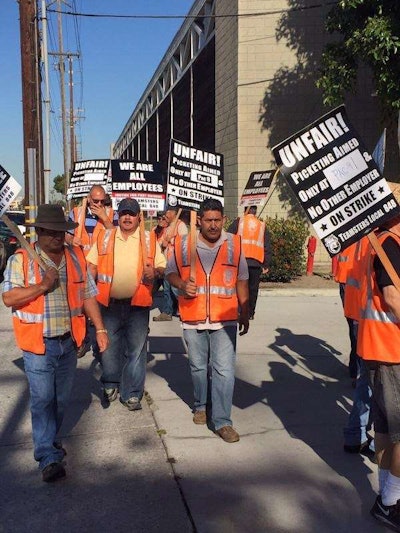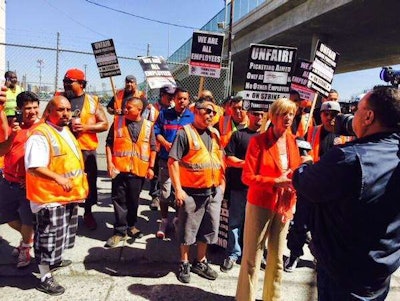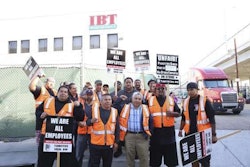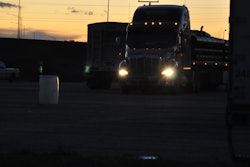 Some Teamsters-affiliated drivers are striking at LA area ports over their classification as contractors.
Some Teamsters-affiliated drivers are striking at LA area ports over their classification as contractors.A protest to reclassify truckers at four California drayage firms from contractors to employees was noted during an April 29 congressional hearing — while picketing at LA area ports has expanded to downtown Los Angeles.
Wednesday marked the third day of the Teamsters-led strike against the non-union Pacer Cartage, Intermodal Bridge Transport, Pacific 9 Transportation and Harbor Rail Transport. The union also added picket lines to the Union Pacific’s Los Angeles Transportation Center.
Protesters say the truckers serving the Los Angeles and Long Beach ports have been misclassified as independent contractors instead of employees.
Rep. Janice Hahn asked Teamsters representative LaMont Byrd about federal avenues to promote fair treatment of truckers during “The Future of Commercial Motor Vehicle Safety: Technology, Safety Initiatives, and the Role of Federal Regulation.”
The California Democrat said many port truckers are misclassified as independent contractors, allowing companies to deduct business expenses from their paychecks. Additionally, delays getting chassis also contribute to trucker wait time, lengthening working hours, she said.
“I have stood in solidarity with these truck drivers on the picket line, and many of these drivers have told me they are overworked and underpaid,” Hahn said. “Recently they have won victories in the courts, but these unfair practices persist.
 Rep. Janice Hahn (D-Calif.) visited the striking drivers earlier this week. At a hearing in Washington on Wednesday, Hahn noted concern about driver classification and its effects on wages and safety.
Rep. Janice Hahn (D-Calif.) visited the striking drivers earlier this week. At a hearing in Washington on Wednesday, Hahn noted concern about driver classification and its effects on wages and safety.Rulemaking underway against coercion may mitigate the situation, Byrd said. The Federal Motor Carrier Safety Administration hopes to publish a Final Rule Sept. 10 that would hike penalties against carriers, shippers and brokers who coerce truckers to drive in violation of federal safety laws.
When the rule becomes final, it would be easier to enforce this rule between a motor carrier and a shipper than a contractor and a shipper, Byrd said.
On April 27, a strike was adverted at a fifth Southern California drayage firm, Green Fleet Systems, after the company and the union announced a comprehensive labor peace agreement. Both said this allows business to continue, but ensures driver rights under the National Labor Relations Act, including selecting a collective bargaining representative.
Earlier this week, Long Beach port CEO Jon Slangerup had said a decrease in productivity is not anticipated and trucks have been able to enter and exit terminals without delay, he said.
The union organized strikes to protest alleged labor law violations at these port companies during the previous two years. In 2012, drivers filed wage and hour claims with the California Department of Labor Standards Enforcement and began suing for wage theft and misclassification.
Meanwhile, West Coast ports are recovering from the cargo backlogged accumulated during the final four months of contract negations between the Pacific Maritime Association and the International Longshore and Warehouse Union. The dockworkers and port employers reached a tentative agreement on a five-year contract Feb. 20.










